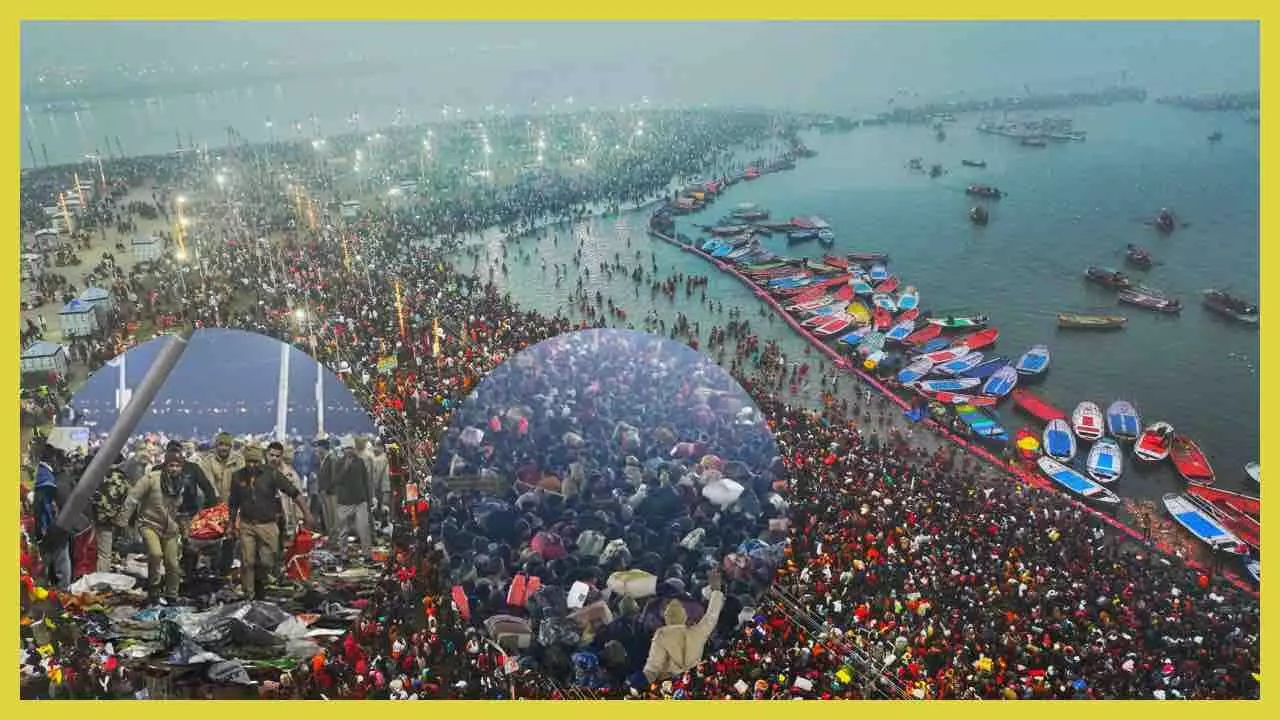TRENDING TAGS :
Maha Kumbh 2025 Reality: Dark Shades of a Rainbow Life
Maha Kumbh 2025 Reality: This is 2025. In 25 years, it will be 2050—half a century will have passed. But what will we have to show for it? There was a stampede at the Kumbh Mela in 1954, and there was another in 2025
Maha Kumbh 2025 Reality (Photo - Social Media)
Maha Kumbh 2025 Reality: Time teaches us a lot—sometimes everything. Both individuals and societies, evolve, refine, and progress with time, becoming more prosperous. But prosperity is not just material; it is also intellectual, humanistic, and spiritual.
Darwin’s theory suggests that humans evolved from apes. Our brains are far more advanced than any other species on Earth. Like humans, nations and societies have also evolved and transformed over time. That’s why we say that humans have progressed from caves, tribes, and forests to where they are today. The nations we now call prosperous, wealthy, and developed were not always this way. Once, they were just like us—or like any underdeveloped tribal society in Africa. Today, they are wealthy, advanced in lifestyle and social structure. That’s why we admire them, praise them, imitate them, envy them, and yearn to escape to their lands.
Our envy, longing, imitation, and desperation to leave stem from the fact that we have not yet reached their level—and don’t seem likely to in the near future.
This is 2025. In 25 years, it will be 2050—half a century will have passed. But what will we have to show for it? There was a stampede at the Kumbh Mela in 1954, and there was another in 2025. Seventy years ago, people were trampled to death; today, it has happened again. Has anything changed? Back then, no government official was held accountable. The same is true today. Yes, one thing has changed—at that time, the number of casualties was not hidden, but today, nothing is clear.
Our level of development is evident from the fact that despite facial recognition, artificial intelligence, CCTV, and drone surveillance, there is no definite count of the dead, injured, or missing. The government either does not know or is too embarrassed to reveal how many stampedes occurred and where.
Our mental, social, and national progress is reflected in the eyewitness accounts of the stampede—describing how, amidst the chaos, human predators were looting the dead and unconscious, stealing money, jewelry, and mobile phones. Some people were busy making videos instead of helping.
Is this our behavior during a grand religious event meant for faith, salvation, and spiritual merit? We have never risen above the grotesque looting that happens during riots, train accidents, and disasters. What kind of progress and GDP growth is this?
Our social evolution is evident in the fact that, despite grand proclamations of equality, democracy, and modernity, we have not erased the stain of VIP culture. We have categorised our masses into NIP - Not Important People, hence no importance towards them.
We claim that in India, there are no more kings and subjects—that all are equal. But no religious leader, politician, influencer, or celebrity set an example by refraining from taking a dip at the Sangam’s prime location. There were numerous ghats along the river, but not a single politician was seen there. No one set an ideal or an example for others to follow.
We have read stories of emperors, kings, and saints who once humbly visited hermits and fell at their feet for wisdom. But in this Kumbh, we saw priests and spiritual leaders giving holy baths to politicians, bowing at their feet. We heard preachers and religious heads making political statements and sloganeering. We even witnessed religious leaders justifying the tragic deaths by calling them a means of attaining salvation by the Ganges—and shockingly, the crowd applauded them. What should we believe? What should we reject?
The Kumbh Mela displays every shade of life—it mirrors the world itself. This is undeniably true. Commerce, politics, rulers and subjects, faith, indifference, truth, lies, grief, joy, despair, outrage—everything is on display. What more remains to be seen?
It is said that a human’s basic instinct is inherently inhuman—common across all races and genes. Only laws, strict rules, and social structures have refined, disciplined, and controlled us, making us cultured, civilized, kind, and orderly. But when restrictions are removed, when an opportunity arises, the basic instinct resurfaces, stripping away all pretenses. If this is true, then we are the perfect example—because we have never changed our basic instincts.
We remain as we have always been—supremely content, deeply faithful. We accept everything as God’s will—life, death, and everything in between. We have thousands of justifications for accepting everything as it is.
It is here that the search for truth vanishes—like the mythical Saraswati River, lost somewhere, merging into another confluence. Anyone who dares to search for it will themselves become extraordinary, transcendent. This is our ultimate reality—not the ultimate truth, because that has long been lost.
(The author is a journalist.)


